Tag Archives: biodiversity
Round three for GigaByte’s vectors of human disease series
Scott Edmunds - December 23, 2024
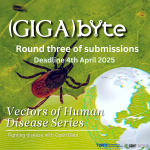
UPDATE: Thanks to additional support from GBIF the deadline has been extended to 6th June 2025. TDR, the Special Programme for Research and Training in Tropical Diseases hosted at the World Health Organization (WHO), GBIF and GigaScience Press have announced a third call for authors to submit Data Release papers on vectors of human disease […]
Filling the Biodiversity Dark Spots: Announcing the Asia Nature Challenge
Scott Edmunds - October 3, 2024

GigaScience Press is helping CitizenScience.Asia mobilise Citizen Scientists Across Asia for a groundbreaking biodiversity initiative from October 18 to 27 2024. Regular readers will have seen our efforts to promote and amplify citizen science projects, citizen science being a key driver of “Open Engagement of Societal Actors”, which was highlighted by UNESCO as one of […]
Publishing Citizen Science Data: Q&A with the Hong Kong Jellyfish Project
Scott Edmunds - May 20, 2024

Today we publish a new Data Release presenting a dataset of jellyfish sightings collected by citizen scientists from 2021 through 2023 within Hong Kong waters. This is the first example where our curation team have worked with a Citizen Science project to share their observations in the GBIF biodiversity database. Here we have a Q&A […]
DNA Day Launch for Hong Kong’s Moonshot for Biology
Scott Edmunds - April 25, 2024

The first emblematic species sequenced by the Hong Kong Biodiversity Genomics Consortium are published to coincide with International DNA Day. Joining a global “moonshot for biology” that aims to sequence, catalogue, and characterize the genomes of all of Earth’s eukaryotic biodiversity. A significant portion of modern knowledge in biology has emerged through sequencing the genetic […]
Citizen Scientists can see the wood for the trees
Hans Zauner - March 6, 2024
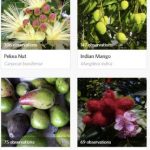
Few countries have a biodiversity that’s comparable to Brazil’s, including plant-based food sources that are little known elsewhere. Even in big cities you may pick all kinds of fruit directly from the tree, which can be both tasty and also interesting for the botanist. The Citizen Science project “Pomar Urbano” collects data on urban fruit-bearing […]
Evolutionary Biology goes Asia: the 3rd AsiaEvo Conference
Chris Hunter - January 10, 2024
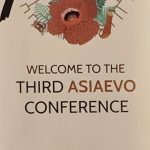
In the beginning GigaScience was at the first AsiaEvo conference, which took place in Shenzhen, China in 2019. Back then, the chair of the first AsiaEvo Conference, Guojie Zhang (longtime friend and board member of GigaScience) said of the history of the AsiaEvo meeting series: “In 2016, at the European Evo-Devo conference in Uppsala, some […]
BioBanking at GGBN 2023: Highlights from GigaScience Press
Chris Armit - November 8, 2023
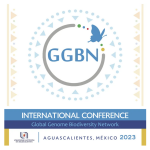
Chris Armit attended the Global Genome Biodiversity Network (GGBN) Conference 2023 in Mexico and reports on the Biobanking heavy agenda.
Converting the Field Records of Early-20th Century Public Health Pioneer to Data
Scott Edmunds - July 18, 2023
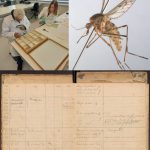
Field notes of the early-20th century entomologist Johanna Bonne-Wepster have been digitized as part of the GigaByte vectors of human disease series
Not all species are equal: Using the h-index to quantify taxonomic bias (author Q&A)
Hans Zauner - August 16, 2022

The h-index is a metric that was invented to summarise the publication output and impact of researchers. In a new GigaScience article, authors from the University of New South Wales (Australia) adopt the controversial metric to explore systematic differences in research interest (taxonomic bias), using mammals as an example.
GigaScience at SPNHC 2022
Chris Armit - June 27, 2022

Write up of the meeting of the Society for the Preservation of Natural History Collections (SPNHC 2022) by Chris Armit.